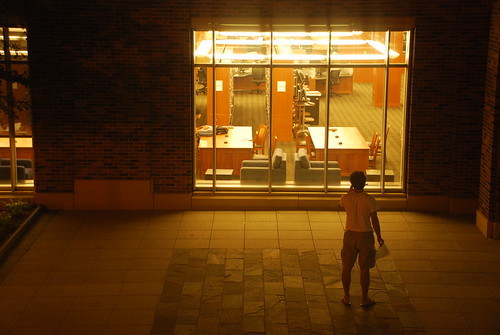We had a flurry of questions at the Reference Desk this spring when members of a Spanish class were asked to write a paper on a pop culture topic of their choosing, using sources in Spanish. How do you find books, scholarly articles, newspaper and magazine articles, or web pages in languages other than English?
As a sample topic, let’s take the (late, lamented) TV show “Buffy the Vampire Slayer.” (Note: as far as we know, nobody in the class was actually researching this topic.)
Google has an Advanced Search feature that allows you to search for pages in any one of a vast number of languages.

This is how we learned that in Spanish, Buffy is ‘la cazavampiros.’ The (351,000!!) search hits include a lot of fan sites, so would be a great place to look if we were interested in, for example, Spanish-language fans’ reactions to this show, or how the vampire mythology played in Spanish-speaking cultures.
What about the opinions of television reviewers in Mexican newspapers? How about the database Latin American Newsstand – 326 articles mentioning ‘Buffy la cazavampiros’, from papers from Rio to Monterrey to San Juan!

How about scholarly articles? A database called HAPI (Hispanic American Periodicals Index) is a great resource for current events, politics and social issues. It covers over 400 journals from the entire Spanish-speaking Americas. Many broader databases of scholarly articles allow you to limit by language as well, for example, MLA, which covers a broad variety of topics in the humanities. (Both have lots on women and television, but nothing on Buffy!)
A search of Duke’s library catalog can be limited to just one language, using a drop-down menu in the Advanced Search.

While we discovered that the Buffy DVDs in Lilly Library have optional tracks dubbed in Spanish, sadly there are no books in Spanish that address Buffy (there are a bunch of English language books!). A broader look at books in Spanish on television or popular culture might have better results: we own 173 books in Spanish that cover aspects of popular culture. Surely one of them must mention Buffy!
Written by Phoebe Acheson
Want to know whether there are computer workstations available in the library before you head over? Check out our new Computer Workstations web page, which links to live data about how many workstations are in use or available in various libraries around campus (like in the chart shown here). Some of them even include floor plans that show you which particular computers are available right now, so you can find them easily when you get there.












 A few weeks ago
A few weeks ago 


 We’re currently encouraging faculty and students to test Connotea (
We’re currently encouraging faculty and students to test Connotea (
